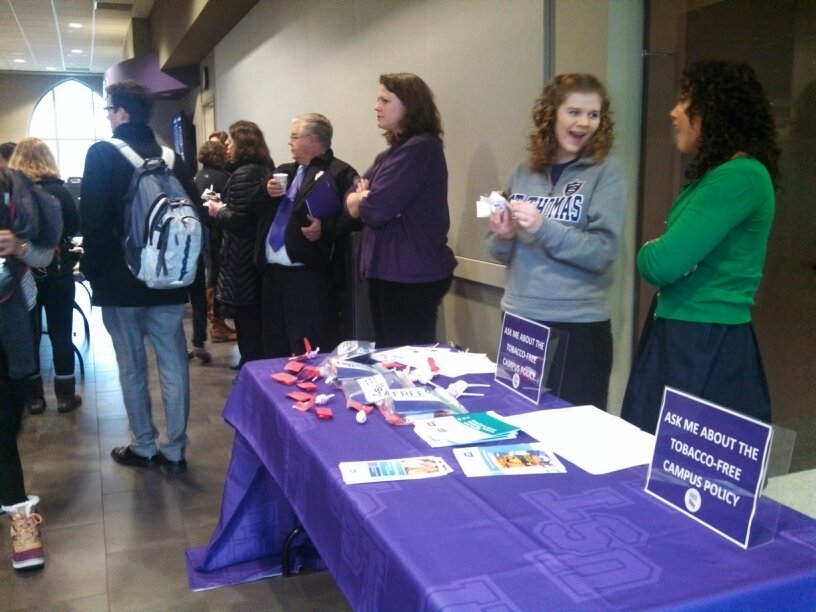St. Thomas announced Thursday it will join the more than 30 tobacco-free college campuses in Minnesota starting Jan. 1, 2014, and university community members gathered in Scooter’s to celebrate what President Julie Sullivan called “an investment in our health.”
“Going tobacco free is an investment in our health and the health of everyone around us,” Sullivan said in a speech at the Thursday afternoon event. “I’m very proud that the University of St. Thomas has made this move.”
Sullivan approved an implementation plan for the ban after reviewing it with university deans and her administrative cabinet earlier this month.
The ban will be put into effect on both the St. Paul and Minneapolis campuses; however, it will not include banning tobacco use in currently occupied faculty and staff residences on the St. Paul campus. After current residents move out, each unit will become tobacco-free. Neither St. Thomas’ Rome campus or the Gainey Conference Center in Owatonna will be affected.
Jolynn Gardner, a health and human performance professor, also spoke at the approximately hour-long event and highlighted the importance of the ban.

“I think sometimes the most important things we can do to protect our health are to put in place those policies and systems that make it a healthier place for everyone,” Gardner said. “I think St. Thomas has done this, and I think it’s consistent with their mission.”
The St. Thomas policy defines “tobacco” as any lighted cigarette, cigar, pipe, clove cigarette, hookah-smoked product, electronic cigarette or smokeless tobacco. Items displaying tobacco logos will also be prohibited.
The university will offer smoking cessation programs through Health Services, the Wellness Center and Counseling and Psychological Services. Confidential counseling will also be offered to university employees.
Senior Heath Clayton attended the celebration and said she is happy the tobacco ban was passed.
“I think it’s a huge step forward for St. Thomas and just promoting a healthy campus,” Clayton said. “It’s really going to allow a lot of students to be able to feel like they are living in a safe place, a healthy place that really promotes great choices.”
Freshman Francesca Ippoliti, who is part of Colleges Against Cancer, said she thinks the ban will have a positive impact on incoming students.
“I think that incoming students, a lot of them will probably like that, because I know personally I don’t like walking around campus and smelling smoke or whatever,” Ippoliti said. “It would be best to make (St. Thomas) a safer and cleaner environment for everyone.”
Sophomore Johnny King said he did not know about the ban before arriving at Scooter’s Thursday, but that it will be a positive move for people who aren’t tobacco users.
“It will stop second hand smoke from people who don’t want to deal with it,” King said.




Still attempting to figure out how exactly they are going to enforce the ban in regards to smokeless tobacco products, specifically chew. Is Public Safety going go up to random kids and say “we saw you spitting a lot open up your mouth.” Also does anyone know if the sidewalk is considered St. Thomas property, specifically Cleveland (closest to St. Thomas) and Summit. I say this because St. Thomas area is filled with plenty of non-UST students and some of which I’m sure smoke. If Cleveland & Summit sidewalks are considered St. Thomas property is Public Safety going to go up to random adults and tell them to put out their cigarettes? If yes I can tell you right now that isn’t going to go over well. Further these adults aren’t going to listen to Public Safety because they have no actual authority over them. I’m a non smoker as well but the tobacco ban seems extremely hard to enforce.
Probably will be hard to enforce, but whatever.
Still can’t believe smokers are fine with the whole “blackening the lungs” thing. Seems counter-intuitive to the whole “living life” thing we all do every day.
This is ludicrous. First of all, everyone who attends Saint Thomas is an adult, and therefore able to make their own decisions about what to put into their bodies. The school really has no place telling students that they can’t smoke in the open air in designated areas. What’s next, the school telling us we’re now a “sugar-free campus” and taking away dessert? Second, has anybody considered that all these previously on-campus smokers are going to move off-campus and begin littering the surrounding streets with tobacco products? That’ll definitely make the neighbors love us more.
Caitlin, St. Thomas is a private university, and therefore can make any decision they want, regardless if “adults are able to make their own decisions about what they put in their bodies”. Students attending St. Thomas choose to go there, so they then choose to abide by the rules of St. Thomas. Therefore, students will have to abide by this smoking ban.
Trust me, Frank, I worked in the library system for four years and people chewing tobacco was easily one of the grossest and easiest things for me to spot. (Especially when people would commandeer our garbage cans to spit in- this is not the wild west, we don’t provide complimentary spittoons).
I don’t totally have a dog in this fight, but the sugar analogy is a weak one. If you choose to eat a bunch of sugar products, the health problems are limited to your body. If I stand next to you while you overindulge in chocolate, my teeth aren’t going to rot. If I have to breathe in the refuse of your tobacco habit, though, I am going to suffer from it. Obviously anecdotal evidence isn’t overly strong but now that I’ve seen several of my grandma’s lifelong non-smoker friends contract emphysema and other traditional “smoker’s illnesses” after lifetimes of smokey workplaces (or husbands), I’d be inclined to support any initiative designed to protect me from the consequences of what “other people put into their bodies.”